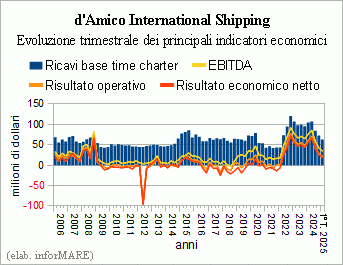
In the first quarter of this year, the
decline in the economic results of the d'Amico company
International Shipping (DIS) having recorded revenues in the period
Base Time Charter of $62.9 million, down
-39.6% on the first three months of 2024. Ebitda is
43.4 million (-54.8%), operating profit of 21.7 million
(-64.0%) and net income of $18.9 million (-66.5%).

Referring to the value of the net economic result, the director
financial officer of the company, Federico Rosen, pointed out that "
However, this is a solid result, reflecting the continued
resilience of the product tanker market, despite a
complex and rapidly evolving macroeconomic and geopolitical issues".
The company's CEO, Carlos Balestra of
Mottola, said that it was "another
highly profitable quarter for DIS. Although the results do not
have reached the exceptional levels recorded in the same
period of the previous year - he explained - continue to reflect
the strength of the product tanker market in the top three
months of 2025". "DIS - he continued - has continued to
benefit from favourable market conditions, supported by
persistent disruptions in trade flows, from a growth in
fleet and an evolution in transport routes
of oil. The diversion of ships around Cape de Buona
Hope, caused by hostilities in the Strait of
Bab-el-Mandeb, and European sanctions on Russian oil, have
changed global trade routes, increasing distances
travel averages and supporting demand measured in
ton-miles. Although fundamentals have recently been
less bright due to temporary factors, such as shrinking
of Chinese crude oil imports and the decline in the margins of
refining, freight rates remain well above average
historical ones".
"Looking to the future," noted Balestra di Mottola
despite the presence of potential peace agreements in Ukraine and Gaza
that could reduce the average distances travelled, we believe that a
limited fleet growth, the structural reconfiguration of
Some trade flows and regulatory pressures will continue
to support the market. Also a return to normality in the
transits of the Suez Canal or the possible lifting of sanctions on the
Russia would be offset by factors such as the increase in
European imports from Asia and the Middle East, or the scrapping of
of obsolete tonnage belonging to the so-called "shadow
fleet". In addition, stricter restrictions imposed by the
U.S. on Iranian oil exports could
redistribute flows to producers not subject to such
sanctions, supporting the demand for VLCC, with positive effects on
other types of tankers'.
Regarding the measures announced by Donald Trump to tax
Chinese ships that land in the USA, Balestra di Mottola has
specified that DIS welcomes "the recent
clarification from the U.S. Trade Representative (U.S.
Trade Representative), on the proposal to introduce tariffs
port ports for ships built in China. The measure - he clarified - is
now more targeted, applying only to construction ships
who make physical calls at US ports, with
exemptions provided for those in ballast and for units above
below certain size limits. Since DIS does not
currently operates no tanker built in China and the
Most of our units are within the limit of
Exemption of ≤55,000 DWT, we do not foresee any impact to us.
A further exemption for ships with a carrying capacity at the
80,000 dwt or less could also extend to
tankers, effectively exempting even our LR1s under construction.
In the medium term, this regulation could strengthen the
market fundamentals, discouraging new orders from
Chinese shipyards, which today account for a
of the global construction capacity".